Move over Lincoln Liam and Sally Todd: It seems Steven Spielberg’s next post-Indy project may involve Sasha Baron Cohen as Abbie Hoffman in The Trial of the Chicago Seven (not to be confused with the Seattle Seven, i.e. the Dude “and, uh, six other guys.”) “The Spielberg film is said to be closer to Munich…than to his next Indiana Jones frolic, due in the summer.” Could be good, and Cohen is dead-on casting. Still, I’ve been looking forward to Spielberg’s Lincoln, and the Hoffman story was done rather recently with Vincent D’Onofrio and Steal this Movie. Update: Concerning the rest of the cast, the recent Vanity Fair Indy article suggests Philip Seymour Hoffman is up for William Kunstler (i.e. the Chicago 7’s lawyer) and that Will Smith, Taye Diggs, Adam Arkin, and Kevin Spacey are also being considered for roles.
Category: History
Mr. Wilson Goes to Washington.
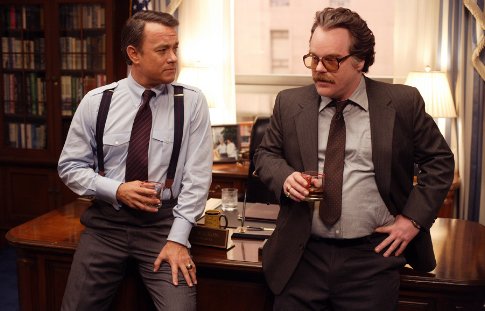
At one point in Mike Nichols’ smart, surprisingly enjoyable Charlie Wilson’s War, the freewheeling, fun-loving Representative Charles Wilson (Tom Hanks), he of the Texas 2nd Congressional District, tells his schlubby, foul-mouthed partner at the CIA, Gust Avrakotos (Philip Seymour Hoffman), “You ain’t James Bond.” Deadpans Avrakotos, “You ain’t Thomas Jefferson, so let’s call it even.” True, Bond and Jefferson they’re not, but that’s actually part of the appeal of Nichols’ lively little film. A strangely optimistic, almost Capraesque movie about the covert proxy war in Afghanistan (and, ultimately, the inadvertent role played by the U.S. in fostering the Taliban), Charlie Wilson’s War — adapted by The West Wing‘s Aaron Sorkin from the book by the late George Crile — is no grim, sober-minded edutainment. Moving at a brisk clip and maintaining a light touch — too light, some might argue — throughout, the movie instead depicts how a few (relatively) ordinary, committed people can change the world…provided one of them is sitting on the House Defense Subcommittee, and has stacked up a sizable amount of chits.
When — after a quick flash-forward setup — we first meet Congressman Charlie Wilson (Tom Hanks, eschewing the Pvt. Ryan earnestness for his more sardonic Bachelor Party/Volunteers side), he’s lounging in a Vegas hot tub with a coke-snorting television producer, a Playboy bunny, and two strippers. In short, he seems like a out-and-out cad. But there’s something endearing and even statesmanlike about his piqued interest in a 60 Minutes report, playing in the corner, on the mujahideen in Afghanistan. (Maybe it’s the Dan Rather Texas connection.) Delving further into the issue back in Washington, Wilson — exercising the power of his crucial committee position — singlehandedly doubles U.S. funding of the mujahideen from $5 million to $10 million. This by-all-accounts token gesture draws the attention of the wealthy Houston socialite Joanne Herring (Julia Roberts, solid), a woman with money, connections, and a fervent commitment to anticommunism, and she sends Wilson off to Pakistan to meet with President Zia-ul-Haq about the situation in neighboring Afghanistan. There, Wilson is moved to the cause by the sight of a dismal refugee camp, and soon enough, he’s enlisted an important ally in Avrakotos, a profane Langley veteran (Hoffman, showing yet another side after Before the Devil and The Savages this year, and nearly running away with the movie.) Together, these three — Wilson, Herring, Avrakotos (John Rambo’s unique contributions to the cause of Afghan freedom are sadly overlooked — set in motion a scheme not only to increase funding radically for the war but to funnel Soviet weaponry owned by Israel and Egypt to the freedom fighters there. Of course, some delicate diplomacy is required, and, in any case, giving Afghan youths an arsenal of helicopter-slaying RPGs doesn’t seem like such a great an idea in retrospect…
While nodding to the dismal events that follow American intervention in the region, Charlie Wilson’s War hardly dwells on the blowback, or on anything — a few refugee camp horror stories and a Pavel Lychnikoff cameo notwithstanding — that might interrupt its tone of hearty, back-slapping jocularity. (Supporting turns by Amy Adams, Emily Blunt, Ned Beatty, Denis O’Hare, John Slattery, and Peter Gerety help speed things along in a comfortable groove.) And yet, however feel-good, Wilson ultimately feels more ripped from the headlines than even the filmmakers could’ve guessed. Some lawmakers have trouble distinguishing between Pakistan and Afghanistan at one point, and Herring begins an introduction of Pakistan’s President by saying, “Zia did not kill Bhutto.” (Leavening the chill that follows this now-eerie moment, Rudy Giuliani and John Murtha also come up at various times as punchlines.)
But, its timeliness and prescience aside, what I found most impressive about Charlie Wilson’s War is how aptly it portrays the feel of Washington. This was somewhat surprising to me as, while I liked Sorkin’s The West Wing decently enough as a TV drama and admired its general idealism about politics, the show always felt rather fake to me. But, be it due to Crile or Sorkin or Nichols, Wilson conveys a lot of the telling details of life inside the Beltway quite well — the hallway horse-trading and neverending quid pro quos, the simultaneous meetings, the bland, institutional cafeterias; the bevy of youngish staffers (and inordinately pretty administrative assistants) on Capitol Hill, the deals crafted over dinner or drinks, the conference calls, the memory holes, myopic thinking, and CYA behavior. Outside of The Wire‘s nuanced take on the compromises of Baltimore city politics, it’s hard to think of a more on-target recent portrayal of the (non-campaigning) political process. Sadly, for Congressman Wilson as for today’s legislators, fiddling with the internal dynamics of far-flung nations we barely understand for short-term gain is All in the Game. Still, as Charlie Wilson’s War proves, don’t let it ever be said that nothing gets done in Washington.
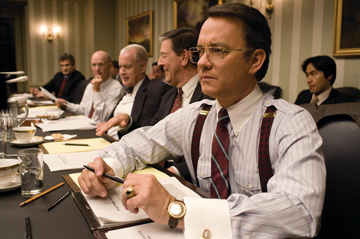
Citizen Plain.
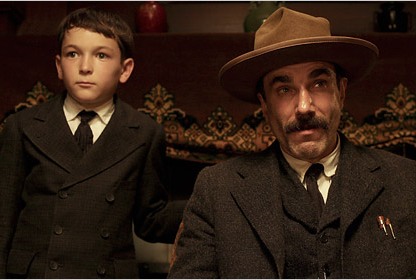 In the opening sequence of Paul Thomas Anderson’s passionate but flawed There Will Be Blood, it is 1898, and a man named Daniel Plainview (Daniel Day-Lewis), alone and driven, casts himself into a dark, dusty hole and hews mineral wealth from the surrounding rock. After suffering a nasty leg injury therein, Plainview hauls himself out of the deep recess through sheer grinding will and, in an act of Herculean exertion rivaling the endgame of Touching the Void, crawls across the sun-baked earth on his back, precious nuggets of silver in hand. This sweating, teeth-gnashing endeavor is an apt metaphor for Anderson’s film. There Will Be Blood looks beautiful, and it has moments of poetry in it. But, like Plainview (and The Assassination of Jesse James, another transplanted 70’s western out this year), it also wears its ambition on its sleeve, and it strains so hard to seem an instant movie classic that it eventually loses its way. (The mostly atonal and distracting Jonny Greenwood score, reminiscent of The Shining, unfortunately doesn’t help.)
In the opening sequence of Paul Thomas Anderson’s passionate but flawed There Will Be Blood, it is 1898, and a man named Daniel Plainview (Daniel Day-Lewis), alone and driven, casts himself into a dark, dusty hole and hews mineral wealth from the surrounding rock. After suffering a nasty leg injury therein, Plainview hauls himself out of the deep recess through sheer grinding will and, in an act of Herculean exertion rivaling the endgame of Touching the Void, crawls across the sun-baked earth on his back, precious nuggets of silver in hand. This sweating, teeth-gnashing endeavor is an apt metaphor for Anderson’s film. There Will Be Blood looks beautiful, and it has moments of poetry in it. But, like Plainview (and The Assassination of Jesse James, another transplanted 70’s western out this year), it also wears its ambition on its sleeve, and it strains so hard to seem an instant movie classic that it eventually loses its way. (The mostly atonal and distracting Jonny Greenwood score, reminiscent of The Shining, unfortunately doesn’t help.)
 Now, in the interest of full disclosure, Paul Thomas Anderson is a director I’ve never warmed to. I thought Boogie Nights was decent but overlong and I had a visceral dislike for both Magnolia and Punch-Drunk Love. (I haven’t seen Hard Eight.) Still, while I think this is Anderson’s best and most accomplished film, and it’s probably worth sitting through for the first third regardless, There Will Be Blood eventually bogs down in some of the usual PTA indulgences. In addition, Daniel Day-Lewis never gives a bad performance and is typically magnetic here, but he also gets more actorly and mannered as the film progresses, and is loonily over-the-top in Blood‘s disastrously misconceived closing moments. (That being said, I wouldn’t be surprised if “I drink YOUR milkshake!” gets some run in the cultural lexicon of useful and memorable movie quotes.) In short, There Will Be Blood is a good film, in some ways even a very good one. But it’s not the landmark masterpiece many reviewers are making it out to be, and it slips into murk well before the end.
Now, in the interest of full disclosure, Paul Thomas Anderson is a director I’ve never warmed to. I thought Boogie Nights was decent but overlong and I had a visceral dislike for both Magnolia and Punch-Drunk Love. (I haven’t seen Hard Eight.) Still, while I think this is Anderson’s best and most accomplished film, and it’s probably worth sitting through for the first third regardless, There Will Be Blood eventually bogs down in some of the usual PTA indulgences. In addition, Daniel Day-Lewis never gives a bad performance and is typically magnetic here, but he also gets more actorly and mannered as the film progresses, and is loonily over-the-top in Blood‘s disastrously misconceived closing moments. (That being said, I wouldn’t be surprised if “I drink YOUR milkshake!” gets some run in the cultural lexicon of useful and memorable movie quotes.) In short, There Will Be Blood is a good film, in some ways even a very good one. But it’s not the landmark masterpiece many reviewers are making it out to be, and it slips into murk well before the end.
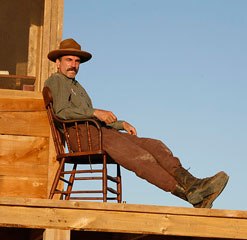 Straying rather far from the Upton Sinclair tome that inspired it, Blood is, in effect, a character study about the dehumanizing consequences of naked ambition. (If that sounds like Citizen Kane, you’re on the right track. PTA is borrowing from Welles, Malick, and Kubrick rather than Altman or Scorsese this time ’round.) After the 1898 prologue, we pick up Daniel Plainview’s story a few years later: He’s moved from silver to oil and has been successful enough to hire on a few workers, one of whom has brought his infant child with him on the dig. Alas, tragedy — a pretty common occurrence in the turn-of-the-century oil business, it seems — strikes at the workplace, and the child becomes Plainview’s. By 1911, this now ten-year-old boy (Dillon Freaser) has become a valuable part of the family business — He’s the silent partner Plainview uses to soften his pitch when dealing with locals or landowners. In any event, the oilman (as he prefers to be known) one day gets a tip from a traveler (Paul Dano) about a town where the black gold literally seeps from the ground. Soon, the Plainviews set up shop in this California hamlet, named Little Boston, and start buying up the place. But standing in his way is another ambitious soul, the evangelical preacher Eli Sunday (also Paul Dano), and he doesn’t want a rival for the town’s admiration. There’s only room for one Great Man in Little Boston…but will his symbol be the Derrick or the Cross?
Straying rather far from the Upton Sinclair tome that inspired it, Blood is, in effect, a character study about the dehumanizing consequences of naked ambition. (If that sounds like Citizen Kane, you’re on the right track. PTA is borrowing from Welles, Malick, and Kubrick rather than Altman or Scorsese this time ’round.) After the 1898 prologue, we pick up Daniel Plainview’s story a few years later: He’s moved from silver to oil and has been successful enough to hire on a few workers, one of whom has brought his infant child with him on the dig. Alas, tragedy — a pretty common occurrence in the turn-of-the-century oil business, it seems — strikes at the workplace, and the child becomes Plainview’s. By 1911, this now ten-year-old boy (Dillon Freaser) has become a valuable part of the family business — He’s the silent partner Plainview uses to soften his pitch when dealing with locals or landowners. In any event, the oilman (as he prefers to be known) one day gets a tip from a traveler (Paul Dano) about a town where the black gold literally seeps from the ground. Soon, the Plainviews set up shop in this California hamlet, named Little Boston, and start buying up the place. But standing in his way is another ambitious soul, the evangelical preacher Eli Sunday (also Paul Dano), and he doesn’t want a rival for the town’s admiration. There’s only room for one Great Man in Little Boston…but will his symbol be the Derrick or the Cross?
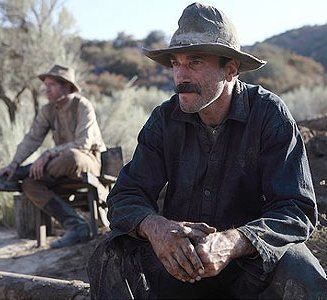 So, as you can see, what we have here is John D. Rockefeller versus Elmer Gantry, commerce versus religion, another virulent intersection of the black gold, texas tea and that old-time fundamentalist religion. But don’t go in expecting Syriana in Progressive Era California just yet. In fact, Blood turns out to be barely political at all. (Somewhere, Sinclair sighs.) Anderson puts several interesting ideas and characters in play, and the first third of the movie is absolutely gripping stuff. But, unfortunately, once all the derricks are in a row, Anderson doesn’t seem to know what to do with them. And so, right around the time Plainview’s first rig goes up in flames, There Will Be Blood begins to stall out. There are some clever reversals in the oilman-churchman balance of power thereafter (the baptism scene, for example), but the movie doesn’t really go anywhere. Instead, for most of the rest of the film, PTA goes back to his well and focuses once again on his pet issue, the meaning and importance of family. (See also Magnolia, Boogie Nights, and, from what I’ve heard, Hard Eight.) He brings a long-lost half-brother (Kevin O’Connor) into the story, has Plainview take extreme umbrage at any suggestion he’s a deadbeat dad, and starts dwelling on the brewing discord and enmity between father and son. (Also a major factor in Oil!, although it’s done rather differently.) Of course, Anderson can be forgiven for concentrating on what most interests him, and plenty of very good directors — maybe even all of ’em — have a tendency to keep ruminating on the same thematic content. Still, given how intriguing There Will Be Blood plays for its first hour, it’s a significant letdown to see PTA fall back into the same old, same old.
So, as you can see, what we have here is John D. Rockefeller versus Elmer Gantry, commerce versus religion, another virulent intersection of the black gold, texas tea and that old-time fundamentalist religion. But don’t go in expecting Syriana in Progressive Era California just yet. In fact, Blood turns out to be barely political at all. (Somewhere, Sinclair sighs.) Anderson puts several interesting ideas and characters in play, and the first third of the movie is absolutely gripping stuff. But, unfortunately, once all the derricks are in a row, Anderson doesn’t seem to know what to do with them. And so, right around the time Plainview’s first rig goes up in flames, There Will Be Blood begins to stall out. There are some clever reversals in the oilman-churchman balance of power thereafter (the baptism scene, for example), but the movie doesn’t really go anywhere. Instead, for most of the rest of the film, PTA goes back to his well and focuses once again on his pet issue, the meaning and importance of family. (See also Magnolia, Boogie Nights, and, from what I’ve heard, Hard Eight.) He brings a long-lost half-brother (Kevin O’Connor) into the story, has Plainview take extreme umbrage at any suggestion he’s a deadbeat dad, and starts dwelling on the brewing discord and enmity between father and son. (Also a major factor in Oil!, although it’s done rather differently.) Of course, Anderson can be forgiven for concentrating on what most interests him, and plenty of very good directors — maybe even all of ’em — have a tendency to keep ruminating on the same thematic content. Still, given how intriguing There Will Be Blood plays for its first hour, it’s a significant letdown to see PTA fall back into the same old, same old.
 Unfortunately, once the spell of Blood is broken, other bad habits of Anderson’s start becoming harder to ignore. Clearly good about giving actors room to breathe (maybe too much room, given DDL’s going off the rails in the final reel here), Anderson can also be distractingly showy (the Scorsese steadicam business in Boogie Nights, for example.) He has a tendency to beat quirky ideas into the ground (Exodus 8:2, the harmonium in Punch-Drunk Love), can hinge a sequence on some really lousy dialogue (“I’m silently judging you“), and often lets scenes meander for several beats too long (anything involving the quiz show in Magnolia.) These tics are more subdued in There Will Be Blood than in any of Anderson’s previous movies, but they become manifest as the film loses focus, and well up with explosive force in the last act. Set in 1927, with Plainview now a wealthy but dissolute drunk in his own Xanadu and Sunday an Aimee Semple McPherson of sorts, the final showdown between our two antagonists is a misfire on multiple levels. Not to give the story away, but the scene relies on far too many suspensions of disbelief. (Why would Sunday come to Plainview, of all people? Would Sunday really not get it beforehand? And, how the heck did he lose money in the stock market in 1927? Note this site: “From 1926 to 1929, the market indices moved up nearly 400%.“) Worse, both Day-Lewis and Dano start blatantly overacting. (Somebody please take that plate of chicken away.) And, what with the bowling alley and milkshakes and whatnot, the last act of There Will Be Blood even comes across as downright silly. It’s an ignominious end for a film that, for its first hour or so, had all the makings of a masterpiece. But, sadly, the gears end up grinding too loudly on this rig, and, just as pride goeth before a fall, it all eventually comes to a crash. Oil is a tricky business.
Unfortunately, once the spell of Blood is broken, other bad habits of Anderson’s start becoming harder to ignore. Clearly good about giving actors room to breathe (maybe too much room, given DDL’s going off the rails in the final reel here), Anderson can also be distractingly showy (the Scorsese steadicam business in Boogie Nights, for example.) He has a tendency to beat quirky ideas into the ground (Exodus 8:2, the harmonium in Punch-Drunk Love), can hinge a sequence on some really lousy dialogue (“I’m silently judging you“), and often lets scenes meander for several beats too long (anything involving the quiz show in Magnolia.) These tics are more subdued in There Will Be Blood than in any of Anderson’s previous movies, but they become manifest as the film loses focus, and well up with explosive force in the last act. Set in 1927, with Plainview now a wealthy but dissolute drunk in his own Xanadu and Sunday an Aimee Semple McPherson of sorts, the final showdown between our two antagonists is a misfire on multiple levels. Not to give the story away, but the scene relies on far too many suspensions of disbelief. (Why would Sunday come to Plainview, of all people? Would Sunday really not get it beforehand? And, how the heck did he lose money in the stock market in 1927? Note this site: “From 1926 to 1929, the market indices moved up nearly 400%.“) Worse, both Day-Lewis and Dano start blatantly overacting. (Somebody please take that plate of chicken away.) And, what with the bowling alley and milkshakes and whatnot, the last act of There Will Be Blood even comes across as downright silly. It’s an ignominious end for a film that, for its first hour or so, had all the makings of a masterpiece. But, sadly, the gears end up grinding too loudly on this rig, and, just as pride goeth before a fall, it all eventually comes to a crash. Oil is a tricky business.
The Pope and “Lyndon B. Magellan.”
“Some 40 years later, it is a Christmastime story, of the war that raged on and of a long-shot airborne peace mission that became the first round-the-world flight of a U.S. president.” The WP‘s Sid Davis tells the story of LBJ’s attempt in 1967 to forge a Christmas peace (not to be confused with Nixon’s 1972 Christmas Bombings.) “To Johnson, weary of war, his health torn by the human cost, attempting a dramatic, attention-grabbing, globe-circling appeal to the pope at Christmas was worth the chance. Undaunted by criticism of his ‘flying circus,’ his “global extravaganza,’ Johnson defended his effort. ‘No man,’ he said, ‘can avoid being moved to try harder for peace at Christmastime.'”
The Hoover Raids.
“In order to make effective these apprehensions, the proclamation suspends the Writ of Habeas Corpus for apprehensions made pursuant to it.” Taking a page from his earlier mentor, A. Mitchell Palmer, FBI Director J. Edgar Hoover, recently declassified documents reveal, floated the idea of interning 12,000 Americans he suspected of disloyalty in 1950, during the Korean War. [Hoover’s letter.] “Hoover wanted President Harry S. Truman to proclaim the mass arrests necessary to ‘protect the country against treason, espionage and sabotage.’ The F.B.I would ‘apprehend all individuals potentially dangerous’ to national security, Hoover’s proposal said.” Thank goodness our intelligence community is past such retrograde thinking and kneejerk trampling on civil liberties today…uh, right?
Mitt’s Muskie Moment.
“I can remember when I heard about the change being made. I was driving home from — I think it was law school, but I was driving home — going through the Fresh Pond rotary in Cambridge, Massachusetts. I heard it on the radio and I pulled over and literally wept.” Regarding the thorny question of the Mormon church and race (discussed earlier here), Mitt Romney, to his credit, addressed the issue about as well as can be expected this morning during the Russert treatment on Meet the Press, even going so far as to tear up a little (Video). My, we’ve come a long way from the days of Ed Muskie. Update: Must be catching…Now Clinton’s crying too. Update 2: And Romney again.
Legend of the Fall.
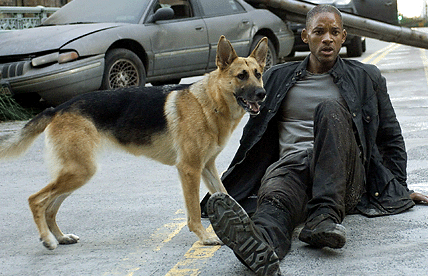
In Francis Lawrence’s I am Legend, Will Smith wanders the streets of New York City, his only companion his trusty, loyal, and free-spirited canine sidekick. To stave off the despair and dementia that lurks behind interminable loneliness, he dotes on his dog and immerses himself in routine: He watches as many movies as possible, indulges in his music collection, broadcasts his continued existence into the ether, and throws himself into his work, a solitary investigation marked by repetition and feelings of futility, one whose fruits he knows will more than likely go unused and unread. To all of this, I say: Who the hell wants to sit through a movie about the last year and change of grad school? And couldn’t they find a sheltie to play l’il Berk? (As for yours truly, I’d have gone Philip Seymour Hoffman or Paul Bettany — maybe Michael Cera for the flashbacks — but, hey, Will Smith works too.)
Seriously, though, when I first heard word they were doing another take on Richard Matheson’s eerie 1954 novella, and that word was penned by hackmeister Akiva Goldsman and read “We’re blowing up the Brooklyn Bridge!“, I figured this would be a big budget stinker, along the lines of Alex Proyas’ version of I, Robot. And yet, while a action blockbuster has been grafted onto the basic story (and it’s moved from suburban California to the heart of Metropolis), Francis Lawrence’s I am Legend is surprisingly true to the grim feel of the novella. In short, Legend is a much quieter and more melancholy film than I ever expected. And, while it definitely has some problems, it’s probably my favorite big budget blockbuster of the year, with the possible exception of The Bourne Ultimatum. True, Lawrence’s take on Constantine in 2005 turned out better than I figured as well. Still, I’m actually quite surprised by how moody and haunting this film turned out to be. (And, give credit where it’s due. Like Paul Haggis and In the Valley of Elah, I’m forced to concede that Goldsman might not always be the kiss of death.)
I am Legend begins innocuously enough with a sports report — It looks like the Yankees and Cubs in the World Series, although LA has an outside shot at a pennant too. But, in the near future, it ain’t just the ball players injecting experimental serums anymore. As a doctor (Emma Thompson) on the news informs us, scientists have altered the measles to work as the ultimate body-cleansing virus, in effect working as a cure for cancer. (A Cure for Cancer! This follows the baseball scores?) Cut to New York City, three years later. Round the decay of that colossal wreck, nothing beside remains…except one man (Will Smith) and his dog (Abbey), chasing down a herd of deer through the empty steel corridors of a desiccated Manhattan. (Sorta like Llewellyn Moss in No Country for Old Men, except now that country is everywhere, and the deermeat is worth more than the bag of money.) Clearly, something has gone Horribly Wrong. As we come to discover, that heralded cure backfired in dismal fashion, killing 90% of the Earth’s population immediately and turning the rest, a la the rage virus in 28 Days and 28 Weeks Later, into violent, depraved monsters with a taste for blood and a susceptibility to sunlight. This Last Man on Earth is one Robert Neville, an army scientist (blessedly immune to the disease) who spends his days in a Jamesian manse on Washington Square, working on a cure to beat back the infection, and his nights just trying to stay alive. (Put simply, “scientific atrocity, he’s the survivor.”) But, even with Samantha, his German shepherd, by his side, the loneliness and omnipresent danger are taking their toll. And as he succumbs deeper into hopelessness — and the creatures show signs of learning — his coping strategies begin to shift. Forget the cure…Maybe it’s time just to chase these Crazy Baldheads out of town…
Now, as I said, I am Legend does have it share of problems. The movie becomes more of a conventional actioner as it moves along, and the last act in particular feels weaker than the rest of the film. Looking exactly like the cave-dwellers in Neil Marshall’s The Descent, the CGI creatures have an ill-favored and badly-rendered look, and the more you see of them the less scary they become. Also, in complete counterpoint to what Dr. Neville tells us about the infecteds’ “social deevolution,” they eventually seem to get behind a Lurtz/Solomon Grundy of sorts. But his presence or authority is never really explained — he’s just a tacked-on Big Bad. I had trouble believing that somebody could’ve heard of Damien Marley but not his father Bob. (And, since you’re seemingly geared to the teeth, Dr. Neville, may I make some suggestions? 1) Infrared scope. 2) Night-Vision goggles.)
All that being said, for most of I am Legend‘s run it’s a surprisingly rich and nuanced film. Will Smith is invariably an appealing presence, but he doesn’t rely on his easy charisma or “Aw, hell no!” bluster much here. His performance is tinged with melancholy, and he does some great work in some really awful moments. Also, I feared going in that the canine companion bit would come across as a gimmick, just a cute creature for Smith to bounce off expository monologues. But Sam isn’t just Wilson the Volleyball — she’s a living, breathing character of her own. (Nor is she Lassie — she doesn’t seem preternaturally smart, and occasionally does dumb dog things, which seemed all too realistic.) And then there’s New York after the Fall, which in itself is a sort of character in the film. In shot after shot (somewhat akin to, but less showy than, the opening Times Square sequence of Vanilla Sky), Lawrence captures the eeriness of this great city laid low. Other than the aforementioned Brooklyn Bridge, “Ground Zero,” as Neville now calls it, hasn’t been destroyed or ravaged. It’s just empty, an overgrown, city-sized echo chamber for his pangs of isolation. (And as the Marley song goes, “It hurts to be alone.”) But, hey, even in a desolate New York City, with vampires lurking in the dark places, there are still plenty of fun ways to pass the time, and particularly if you have a good dog by your side.
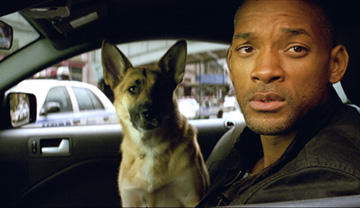
Cuba? Don’t they make mojitos?
“‘I was panicked a bit because I really don’t know about…the Cuban Missile Crisis,’ said Perino, who at 35 was born about a decade after the 1962 U.S.-Soviet nuclear showdown. ‘It had to do with Cuba and missiles, I’m pretty sure.‘” Wait, wait, wait…what? By way of Ben of The Oak, it seems Dubya press secretary Dana Perino has never heard of the Cuban Missile Crisis. “So she consulted her best source. ‘I came home and I asked my husband,’ she recalled. ‘I said, “Wasn’t that like the Bay of Pigs thing?” And he said, “Oh, Dana.”‘” Ladies and Gentlemen, the spokesperson for our current president. Have we fallen so far? And if that sounds like a pedantic thing to say, well, consider me pedantic. I know nobody wants to work for this misfit administration anymore, but, we’ve a lot of people in this country, and many of ’em are still even Republicans. Perhaps we can find someone to fill the position of the president’s mouthpiece who knows a thing or two about major events in American history over the past fifty years? That’d be great.
For Whom the Corona Clacks.

When I first saw the trailer for Joe Wright’s version of Ian McEwan’s Atonement, I figured I’d probably give it a pass — It had that staid period piece look to it that screams inert Oscar bait (see also The English Patient), and seemed far too dry and conventional to do justice to Ian McEwan’s powerful, absorbing novel. But, having sat through it several more times, I got Dario Marianelli’s pensive piano-and-typewriter score stuck in my head, and when the reviews came back significantly better than I expected (and, indeed, the film garnered 7 Globe nominations this morning), I figured I’d give it a go. And the verdict…well, it comes out somewhere in-between. Atonement is solid enough entertainment of the Merchant-Ivory sort, and it features break-out performances by The Last King of Scotland‘s James McAvoy (that whooshing sound you hear is all of Ewan MacGregor’s old scripts getting remailed) and newcomer Romola Garai. But, although occasionally you can see director Joe Wright try to stick his head under the water, the movie sadly just skims along the surface of McEwan’s book. And as an adaptation of said book, it must be considered a failure.
Now, admittedly, there’s a pretty tough degree of difficulty here. I hesitate to think any book is inherently unfilmable — just this month we’ve had two excellent adaptations in No Country for Old Men and The Diving Bell and the Butterfly — but McEwan’s dense tome, with its rich inner worlds, abrupt shifts in time, and philosophical musings on the power and moral dangers of writing and imagination, comes pretty darn close. Regardless, Atonement the film never plumbs the depths that McEwan’s novel does, a fact that unfortunately becomes more and more unmistakable as the movie progresses. By the end, all the crisp British diction and sweeping long-takes can’t disguise the fact that Atonement, however pretty, never captures the book’s mordant pulse.
To the story: Atonement begins at an edenic English manor on one of the hottest days of 1935, where an ambitious, headstrong 12-year-old girl named Briony Tallis (Saoirse Roman, a find) has just completed her first full-length play, The Trials of Arabella. (Like many aspiring writers, myself included, Ms. Tallis just loves her some descriptive adjectives.) Young Briony is unsuccessfully trying to convince her bored cousins, visiting on account of a hush-hush impending divorce, to take her magnum opus seriously, when she sees something unexpected. Outside her window, Robbie the housekeeper’s son (McAvoy) appears to be ogling Briony’s soaking wet, nearly-naked sister Cecilia (Keira Knightley) with amusement and maybe even something darker…what’s the word? As Briony tries to piece it together, we discover Cecilia and Robbie are Oxford classmates, although (by Cecilia’s design as well as by class distinctions) they travel in rather different circles. Yet, something flickers between them, and Robbie, while mustering up the nerve to express his affection, types out several different drafts of a love note in his nearby cottage…one of which, composed as a bit of a joke, gets right to the point. (It uses the c-word, and alone gives the film an R-rating. Gasp!) Well, you can then guess which version of the letter mistakenly gets delivered, and by Briony no less, who takes it upon herself to examine it first. Her pre-adolescent confusion mounting, Briony is now seriously distressed by Robbie, on whom she once had a barely understood crush. And when further events that hot summer evening eventually take a turn towards tragedy, she — knowing full well now that he’s a sex maniac — mounts a false accusation against him, one that changes irrevocably the lives of Robbie, Cecilia — and Briony — forever.
Wright’s Atonement does alright by most of this, the first act of McEwan’s book. He cleverly uses the Rashomon device of showing us the same scene several times, and always from Briony’s limited perspective first. But, while Roman seems a gifted and composed actress for her age, the film never really gets across the crucially important fact about Briony: her constant flights of fancy. (It’s not my movie, of course, but I kept thinking what Atonement needed here is something like what Peter Jackson does in Heavenly Creatures, a brief dramatization of her inner fantasy world.) This becomes a constant problem in the film, particularly as it moves on to the fields of Dunkirk and the hospitals of London just before the Blitz — the movie never does a particularly good job of getting into its characters’ heads. As a result, it shows us what happens in the book, but it barely conveys why these events are important or meaningful for our story.
One of the most egregious example of this is an extremely long shot of the chaos at Dunkirk, rivaling the similar extended takes in Alfonso Cuaron’s Children of Men last year: Wounded and dog-tired, Robbie and his two soldier mates wander around the beach, seeing all manner of wartime horror and tomfoolery. But, as it lingers on and on, the shot feels more and more like a stunt, completely dissociated from the tale we’ve theoretically been following. I guess it’d probably play great in a WWII epic that’s actually about Dunkirk, but the important action at that moment for our story is happening within Robbie. Perhaps Wright was trying to make a similar point about film with that exasperating stunt-take as McEwan ultimately does about writing…but, if so, I missed it. (There are other, subtler moments where he comes closer, tho’ — I quite liked Nurse Briony’s red curtain (stage) entrance to her conversation with the French soldier.)
This inherent flaw of Wright’s Atonement — its inability to depict the characters’ interior lives — reaches its nadir in the final moments of the film, when it almost completely botches the final reveal. I won’t give away what happens here, other than to say that, as Matt Zoller Seitz points out, what was a quietly devastating confession to the reader in the book now — because it is voiced in public — instead plays like a tacked-on mea culpa that offers a twist-ending, a saccharine moral, and a few moments of cinema apotheosis, all wrapped up in a Hollywood bow. (Again, not my movie, but having this reveal explained in voiceover over images of the character’s last, lonely days, a la TLJ in No Country, would’ve made a lot more sense.) In a way, Atonement makes exactly the same misstep as Weitz’s Golden Compass: The very last images of the movie are pitched right at the Titanic demographic (and I don’t mean that as a sneer — I loved Titanic.) But they completely sidestep the inherent darkness of McEwan’s ending, and even let the character in question off the hook. Atonement, in McEwan’s world, was never so neat, or easy to come by.
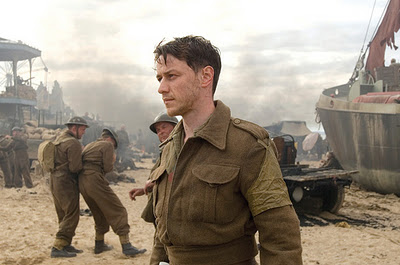
We are Lincoln MEN 2B?
By way of Dangerous Meta, a cardiologist argues in a new, soon-to-be-published e-book that Abraham Lincoln might be the earliest known case of a rare genetic disorder. “Sotos believes Lincoln had a genetic syndrome called MEN 2B. He thinks the diagnosis not only accounts for Lincoln’s great height, which has been the subject of most medical speculation over the years, but also for many of the president’s other reported ailments and behaviors.“
